Wildlife could drop two-thirds by 2020: WWF
WWF’s Living Planet Report 2016 predicts decline of global wildlife populations by an average of 67 per cent in the timeline between 1970 and 2020, as a result of human activities. The report indicates that global populations of fish, birds, mammals, amphibians and reptiles have already declined by 58 per cent between 1970 and 2012, the most recent year with available data. This places the world on a trajectory of a potential two-thirds decline within a span of the half-century ending in 2020.The report also highlights the magnitude of human impact on the planet and highlights the changes needed in the way society is fed and fuelled.
“Wildlife is disappearing within our lifetimes at an unprecedented rate,” said Dr. Marco Lambertini, International Director General, WWF. “This is not just about the wonderful species we all love; biodiversity forms the foundation of healthy forests, rivers and oceans. Take away species, and these ecosystems will collapse along with the clean air, water, food and climate services that they provide us. We have the tools to fix this problem and we need to start using them now if we are serious about preserving a living planet for our own survival and prosperity.”
According to the report, the top threats to species are directly linked to human activities, including habitatloss, degradation and overexploitation of wildlife. The report’s findings provide additional evidence that the planet is entering completely unchartered territory in its history in which humanity is shaping changes on the Earth, including a possible sixth mass extinction. Researchers are already calling this period the Anthropocene– an era in which human activities are influencing changes in the climate and the environment.
The 2016 edition of the Living Planet Report states that food production to meet the complex demands of an expanding human population is the primary factor responsible for the destruction of habitats and overexploitation of wildlife. At present, agriculture occupies about one-third of the Earth’s total land area and accounts for almost 70 per cent of water use.
The report also shows that India ranks fifth in terms of bio-capacity – an ecosystem’s capacity to produce resources such as food, fibre and renewable raw materials and absorb carbon dioxide. While Indians have a low personal footprint at an individual level, it is a challenge when aggregated by population size. This equation will be further affected as wealth grows and consumption patterns change. India’s carbon footprint currently makes up 53% of the country’s overall Ecological Footprint.
“Our consumption patterns and the way we look at our natural world are constantly shaping the future of our planet. At WWF-India we believe that the power to build a resilient planet for future generations lies in our understanding of how we are moving into this new epoch that scientists are calling the Anthropocene and adopting sustainable practices that decrease humanity’s impacts on the planet. We need to come together as a global community and address the threats to biodiversity to protect our environment, as well as our economic and social structures,” said Mr. Ravi Singh, Secretary General and CEO, WWF-India.
Looking ahead, however, 2020 is also a year of great promise. In that year, commitments made under the Paris climate deal will kick in, and the first environmental actions under the globe’s new sustainable development plan are due. If implemented, these measures, along with meeting international biodiversity targets set for 2020, can help achieve the reforms needed in the world's food and energy systems to protect wildlife across the globe.
The Living Planet Report 2016 highlights the fact that we need to rethink how we produce, consume, and value the natural environment. It also illustrates the positive momentum that is building by highlighting recent global agreements on climate change and sustainable development. In particular, the report recognizes the 2030 Agenda for Sustainable Development as an essential guide to decision-making that can ensure that the environment is valued alongside economic and social interests.
Living Planet Report 2016: Risk and resilience in a new era is the eleventh edition of WWF's biennial flagship publication. The report tracks over 14,000 vertebrate populations of over 3,700 species from 1970 to 2012.
Other Contents by Author
The regional meet of the all the North-Eastern States Legal Services Authorities under the aegis of the National States Legal Servives Authorities was held at Shillong on September 27 and was inaugurated by Hon'ble Mr Justice Ranjan Gogoi, Judge, Supreme Court of India & Executive Chairman, National Legal Services Authority.The Meet which saw the participation of the Chief Justices and Judges from the states of Arunachal Pradesh, Assam, Manipur, Meghalaya, Mizoram, Nagaland, Sikkim and Tripura accompanied by the Judicial Officers of the respective states commenced with the inaugural programme by the delivery of welcome address by Hon'ble Mr Justice Sudip Ranjan Sen, Judge,...
The Committee on Racial Discrimination under Urgent Action and Early Warning Procedure dated August 15th 2008, recommended India to repeal the Armed Forces Special Powers Act (CERD/C/IND/CO/19). India was asked to submit the report latest by December 31st 2008, but the report is still awaited. Presenting his statement on the Violation of International Convention on Elimination of All Forms of Racial Discrimination during the 36th Regular Session of Human Rights Council in Geneva on Monday, Pankaj Jyoti Hazarika, Chief Functionary of NGO Prahar said, “Most of human rights violation issues in Northeast especially in Assam are caused by the inadequate measurement and negligent attitude...
Nazira boy, Tanmoy Boruah is all set to particpate in the All India Sub Junior Ranking Badminton Tournament to be held in Goa beginning October 9. Tanmoy is currently the All India Ranking 2 player. He trains with coach Alok Boruah in the Ruhiteswar Saikia Memorial Indoor Stadium in Nazira.
The present imbroglio on the Chakma-Hajong Rights issue is a reflection of monumental failure and mismanagement by the government. Civil organizations urge restoration of all rights to vulnerable Chakmas and Hajongs without further delay as 90 per cent of them are already citizens by birth and hence the restoration of Citizenship Rights is out of question. Right Cause, an organization working for the marginalized and vulnerable tribal groups is concerned with the continuing denial and deprivation of legitimate democratic rights of the Chakmas and Hajongs of Arunachal Pradesh. The issue of citizenship in Arunachal Pradesh is a fall out of the anti-foreigner agitation in Assam and is...
APCC Vice President, Debabrata Saikia in a communiqué stated that, “It is unbecoming of a DGP to make a statement that the undergoing of arms training by the RSS is not a violation of law and is done purportedly to appease the RSS.”Such training which create tensions, animosity and hatred between communities besides encouraging divisive forces, if not construed an offence, what else would it be, he questioned.He said, “If the Chief Secretary, who is the Administrative Head of the Government, has to brief the RSS on Government development works, it is natural for the DGP to follow suit.”The communiqué went on to say that Assam Police has failed to identify and arrest the murderers of ABMSU...
Every year dynamic monsoon induced flooding coupled with flash floods cause immense loss to life and property in Assam which falls in the highest rainfall intensity zone in the country. With a total of 5531.41 hectares of crop land affected, Mayong, Laharighat and Bhuragaon Revenue Circles in Morigaon district in Assam are still enlisted under flood affected areas by the State Disaster Management Authority. Seasonal flooding and erosion has inundated several revenue villages and have given rise to massive internal displacement in Morigaon forcing flood survivors to occupy forest lands. Human populations, school infrastructures, grazing animals and poultry are equally facing the...
A number of one hundred and thirty one teamsfrom 70 schools of North East India came together to vie for the title of North East Champions at the city-level finals of the Wild Wisdom Quiz 2017 held in the city recently. Runninginto its tenth year, the Wild Wisdom Quiz is the biggest wildlife quiz for school students in Asia and the only one of its kind in India. Organized by WWF-India the quiz was supported by Discovery Kids and Central Board of Secondary Education (CBSE). Some 4170 students from Assam, Meghalaya, Manipur, Mizoram, Nagaland, Tripura and Arunachal Pradesh participatedthis season,besides, one wild card entry winning team from North East according to Archita Baruah...
The Kuki Students’ Organisation (KSO) and Karbi Anglong District committee, called on the Chief Executive Member, KAAC, Tuliram Ronghang at his official residence Wednesday in connection with the representation submitted by the Kuki civil bodies on July 7, 2017 at his office chamber in the subject matter of one government nominated KAAC seat out of four, in respect of their projected candidate for the 12th KAAC term (2017 – 2021). The delegates reminded him in writing to actively consider their projected candidate so as to enable the representation of the unrepresented Kuki Tribes in the KAAC for peace and all-round development of the Kuki community in particular and Karbi Anglong as...
The Government of Assam Sunday declared Journalist Pension to twenty senior journalists of the state for the first time under the Assam Pension Scheme for Journalists. The selected journalists are: Benoy Bhusan Sen (Dhubri), Rama Sankar Rai (Kamrup Metro), Prema Dhar Sarma (Kamrup Metro), Garga Ram Barman (Kamrup Metro), Naren Hazarika (Kamrup Metro), Probodh Ch. Bordoloi (Kamrup Metro), Krishna Ch. Kalita (Kamrup Metro), Ratneswar Talukdar (Barpeta), Amal Kumar Gupta (Kamrup Metro), Devendra Kumar Pandey (Lakhimpur), Ajit Kr. Patwary (Kamrup Metro), Goverdhan Prashad Atal (Jorhat), Nirupama Borah (Lakhimpur), Pramod Kumar Singh (Jorhat), Dharani Kalita (Kamrup Metro), Bhakti Ram Roy...
The Corbett Foundation, Kaziranga Chapter in association with the Kaziranga National Park authorities celebrated World Elephant Day at Bokakhat today. World Elephant Day is an international annual event dedicated to the preservation and protection of the world's elephants. The first World Elephant Day was held on August 12, 2012. Assam is home to over 5000 wild elephants. The event was organised in front of Bokakhat Natya Mandir where eminent artists of Kaziranga landscape demonstrated their skills and imagination with brush on canvases as large as 4 ft x16 ft on issues like poaching for tusks, habitat loss and deforestation. Dr. Naveen Pandey, a conservation medicine professional and...

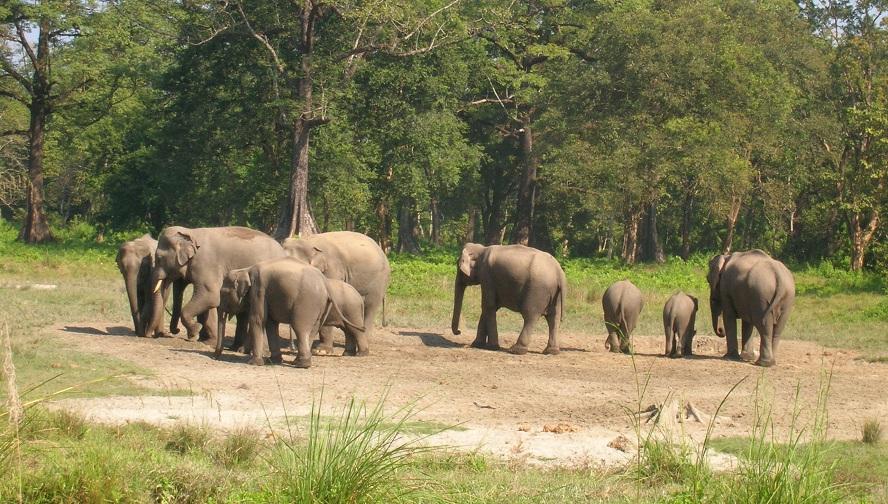
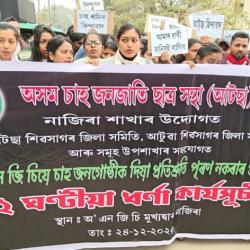
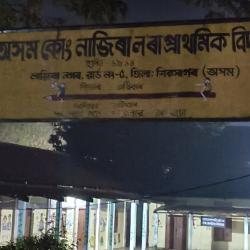


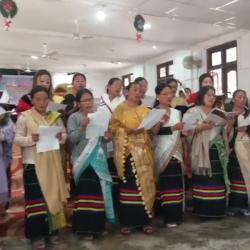

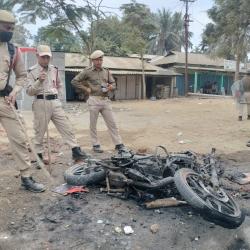

Add new comment